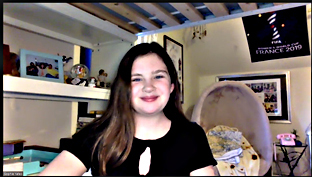
Sophie Yates participates in a Zoom interview from her home in Bristol on Sunday, Jan. 31. Yates is a member of the Maine Department of Education Student Cabinet. (Screenshot)
The Maine Department of Education’s Student Cabinet provides an important forum for Lincoln County students to voice their ideas about issues that impact them.
Lincoln County has three students participating this year, including Boothbay Region High School’s Emma Markowitz and Bristol Consolidated School’s Sophie Yates.
“The idea is to learn from the kids,” cabinet administrator Rachel Paling said.
For the second year since the cabinet’s inception, student representatives, from fourth graders to college freshmen, representing all 16 counties in Maine, have met over Zoom to brainstorm solutions to the issues students face on a daily basis.
Last year’s key topics included bullying, mental health, racism, and cultural bias. But the program shifted gears due to COVID-19, tackling some of the new strategies implemented by schools, such as hybrid learning, and providing input on the framework for reopening schools.
The cabinet is still tackling those overarching themes and addressing the effects of the pandemic on a generation of students.
“We let students brainstorm to decide the goals,” Paling said. “They have a huge list, and similar to last year, mental health is a topic bubbling up to the top.”
Paling said that “the students are bringing up the same things the adults are bringing up.”
Markowitz, a sophomore at BRHS, is a product of several different educational experiences, from the Waldorf curriculum to homeschooling to public school. Markowitz wrote her application essay for the cabinet on the topic of diversity in education.
Markowitz’s educational history, particularly with the Waldorf curriculum, leads her to believe that schools are lacking a hands-on approach to learning that was a significant part of her own education.
The Association of Waldorf Schools of North America describes the Waldorf curriculum as “a developmentally appropriate, experiential, and academically rigorous approach to education that integrates the arts in all academic disciplines.”
Markowitz said her goal is to improve Maine schools by working with the cabinet to determine ways in which kids are struggling within the existing system. Markowitz sees “burnout” as a significant area of concern among the student population and feels that a more hands-on approach and a stronger focus on the arts could help.
She likes “how kids from Caribou to South Portland have different perspectives on learning.” She said that “it’s an incredible feeling to go into a room with all these people your age who are so motivated to help.”
She likes that the cabinet “offers us an opportunity to have a voice in the system,” she said, and finds it rewarding “to know this is actually going toward helping something larger than myself.”
Last year, Markowitz was involved in creating a public service announcement about physical distancing and in addressing racism in schools by providing input on materials to educate teachers on anti-racist practices.
Markowitz is passionate about the cabinet and its real-world impact. She said that she “would love to be on for as long as possible. It’s an incredible opportunity. I’m not sure if I will be able to do it again, but I hope so.”
Yates, an eighth grader at BCS, said she applied to the cabinet because she “really wanted to help represent people with mental illness and disabilities.”
She believes every student can benefit from an increased focus on mental health, particularly during the increased stress of learning through a pandemic. She wants to play a role in removing stigmas and finding ways to improve student experiences.
“Things are heightened, people are depressed,” Yates said of the COVID-19 climate. One major project she has been working on in conjunction with the student cabinet is a new Department of Education initiative called Wilderness Activities and Virtual Engagement for Students, or WAVES.
According to the department, the initiative “will engage youth through a series of social media challenges and other virtual and outdoor opportunities to connect with peers.” The initiative includes a searchable database where teens can find “outdoor engagement opportunities such as ice fishing derbies or hiking clubs.”
Yates is also focused on the issue of bullying — not just on those who are victims, but also on those who engage in bullying behavior. “It’s hard to be bullied,” Yates said, before adding that bullies may also need help. “There needs to be a support system for both.”
Yates recalled being struck by a news photograph of a student studying under a streetlight. She knows not everyone has the same access to a safe and comfortable learning environment when they are not at school and she thinks teachers need to be sympathetic toward students’ home lives.
“Kids need to have a place to go and a person to be a support,” Yates said. “I want everyone in every corner in every country to know you have to be able to support people who can’t support themselves.”



